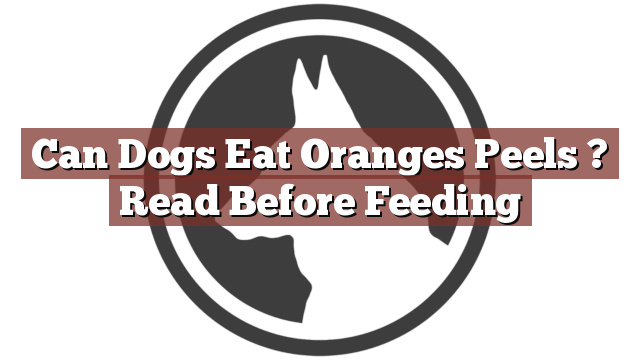Understanding Your Dog’s Dietary Needs
As pet owners, it is essential to understand our dogs’ dietary needs to ensure their overall health and well-being. While dogs are primarily carnivores, they can also benefit from consuming certain fruits and vegetables. However, it is crucial to know which foods are safe for our furry friends and which ones to avoid. One popular question many dog owners have is, "Can dogs eat orange peels?" To answer this question, let’s delve deeper into the topic and explore the pros and cons of feeding orange peels to dogs.
Can Dogs Eat Orange Peels? Read Before Feeding
Can dogs eat orange peels? The answer is no. Although oranges themselves are not toxic to dogs and can actually provide some health benefits, the same cannot be said for orange peels. Orange peels contain essential oils and compounds that can be harmful to dogs when ingested in large amounts. These oils can cause digestive issues, such as vomiting and diarrhea. Moreover, the high fiber content of orange peels can be difficult for dogs to digest, potentially leading to gastrointestinal blockages.
Pros and Cons of Feeding Orange Peels to Dogs
Feeding orange peels to dogs may have some potential benefits, but the risks outweigh the advantages. Here are a few pros and cons to consider:
Pros:
- Nutritional Value: Orange peels contain certain nutrients like vitamin C, fiber, and antioxidants that can be beneficial. However, these nutrients can be obtained from safer sources, such as fresh fruits and vegetables recommended for dogs.
- Dental Health: Chewing on orange peels may help in cleaning your dog’s teeth and freshening their breath. However, there are safer alternatives available, such as dental chews and specially formulated dog toothpaste.
Cons:
- Digestive Issues: The oils and compounds present in orange peels can irritate your dog’s digestive system, leading to gastrointestinal problems.
- Potential Blockages: Dogs may have difficulty digesting the high fiber content in orange peels, increasing the risk of gastrointestinal blockages that may require medical intervention.
- Allergic Reactions: Some dogs may be allergic to citrus fruits, including oranges. Feeding them orange peels can trigger allergic reactions, causing skin irritations, itching, and other discomforts.
In Conclusion: Consider Alternatives to Feeding Orange Peels to Dogs
While it may be tempting to offer your furry friend a taste of orange peels, it is best to avoid doing so. The risks associated with feeding orange peels to dogs outweigh any potential benefits they may offer. Instead, provide your dog with a well-balanced and appropriate diet consisting of dog-friendly fruits and vegetables that have been approved by veterinarians. If you have any concerns about your dog’s diet or are unsure about certain foods, it is always recommended to consult with a veterinarian to ensure the safety and well-being of your beloved pet.
Thank you for taking the time to read through our exploration of [page_title]. As every dog lover knows, our furry friends have unique dietary needs and responses, often varying from one canine to another. This is why it's paramount to approach any changes in their diet with caution and knowledge.
Before introducing any new treats or making alterations to your dog's diet based on our insights, it's crucial to consult with a veterinarian about [page_title]. Their expertise ensures that the choices you make are well-suited to your particular pet's health and well-being.
Even seemingly harmless foods can sometimes lead to allergic reactions or digestive issues, which is why monitoring your dog after introducing any new food item is essential.
The content provided here on [page_title] is crafted with care, thorough research, and a genuine love for dogs. Nevertheless, it serves as a general guideline and should not be considered a substitute for professional veterinary advice.
Always prioritize the expert insights of your veterinarian, and remember that the health and happiness of your furry companion come first.
May your journey with your pet continue to be filled with joy, love, and safe culinary adventures. Happy reading, and even happier snacking for your canine friend!

